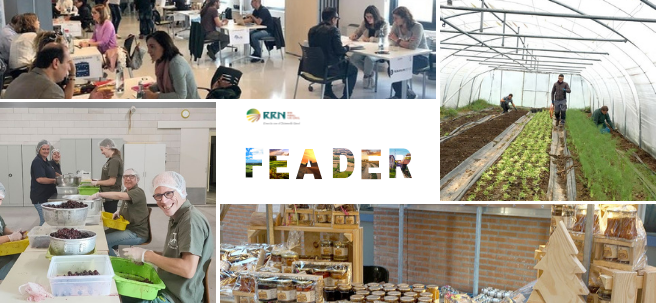
12 de November de 2020
Dinamización rural
Innovación
Dinamización rural
Innovación
Strengthening the socioeconomic fabric of rural areas is one of the three general objectives of the new Common Agricultural Policy (CAP) post 2020. Thus, during the current period of the CAP 2014-2020, the European Agricultural Fund for Rural Development (EAFRD) has achieved - through the Rural Development Programmes (RDP) - that various rural areas in Europe have achieved a good functioning of their services, as well as business development and the transformation of them into inclusive and populated communities.
- Rural Development Programs (RDPs) help rural areas leverage their resources to turn challenges into opportunities.
 |
The EAFRD establishes three interlinked areas to guide the development of rural areas in Europe:
1. Rural services: Rural communities cannot exist without adequate services and infrastructure to meet the needs of their inhabitants. Accessibility to services is fundamental to the well-being and socioeconomic well-being of residents. Quality in services such as health, education, mobility, energy, and digitalization holds the key to development in rural areas.
2. Rural employment: Rural economies—in addition to developing their primary sectors—are well positioned to take advantage of the opportunities offered by emerging economic sectors such as the bioeconomy, green and circular economies, and the experience economy (based on their natural and cultural heritage).
3. Social inclusion: building rural communities through LEADER , primarily.
FEADER success stories in social inclusion
Rural communities must foster collective action to take advantage of opportunities that improve their living conditions. RDPs, and particularly LEADER, can help identify specific needs at the local level and connect stakeholders.
Some examples of inclusive rural communities in Europe are:
A care farm in Wallonia, Belgium
RDPs can support activities such as social farming, which is the use of agriculture as a means to counter the isolation of vulnerable groups. These projects also offer farmers opportunities for income diversification.
In the case of Wallonia, this farm uses RDP funding to promote the social rehabilitation of these groups. Thus, the " Positive Agritude " project offers patients from the neighboring L'Accueil Hospital in Lierneux, near Liège, the opportunity to volunteer for five hours a week at one of the 26 nearby partner farms. These patients suffer from addictions, psychosis, depression, or learning difficulties.
There are currently 23 users participating in the program.
Odisseu Project (Catalonia, Spain)
An unfavorable demographic situation and a weak labor market are further reasons for depopulation. One way to address this problem is to encourage young people to live and work in rural areas.
In 2017, the Local Action Group (LAG) Alt Urgell-Cerdanya (Catalonia) used LEADER funding from the Catalan RDP to launch the Odisseu project . Its aim was to promote the return of young people to rural areas through job opportunities.
The project developed tools to address the gap between companies, potential employers, and universities in their pipeline of young local talent. Solutions included the 'OdisseuPracticum' internship program and the 'Retorna' online job platform.
The number of companies participating in the program increased from 11 in 2017 (the first edition) to 112 in 2019, and more than 170 young people have already benefited from paid internships. In each edition, between 12% and 25% of participants obtained at least a one-year contract with their host companies.
A social farm in the Netherlands
De Laarhoeve is a private social farm that aims to employ people with mental health issues and provide them with a safe, family-friendly environment so they can enter the workforce while practicing their skills. Employees are trained and supported to develop their full potential, and the farm is open to the public to foster communication between its employees and customers.
The farm produces its own agricultural products and sells them to local stores. Local producers also bring their products not suitable for direct market sale (cherries, for example) to be processed and packaged on the farm. Once this is done, the producers take the products (cherry jam, for example) to be sold under their own label.
De Laarhoeve currently serves 16 local agricultural businesses.









